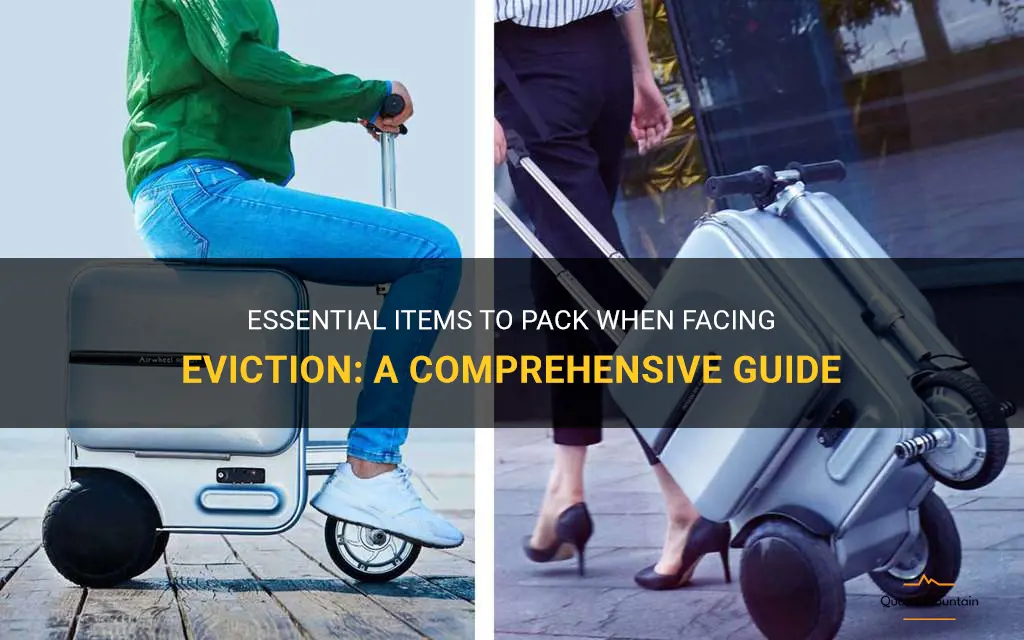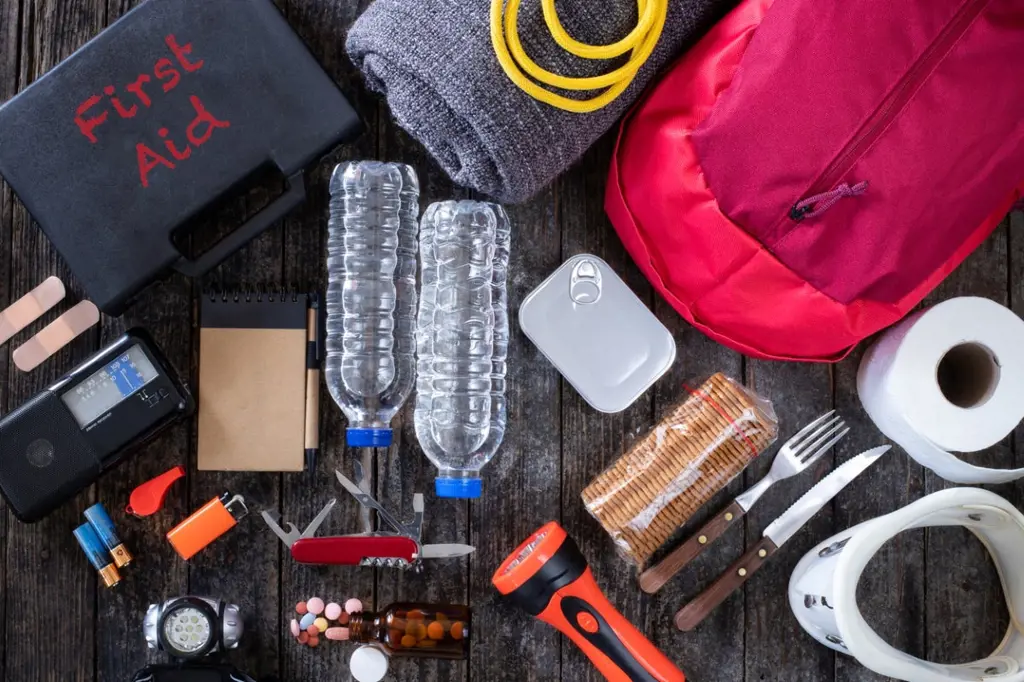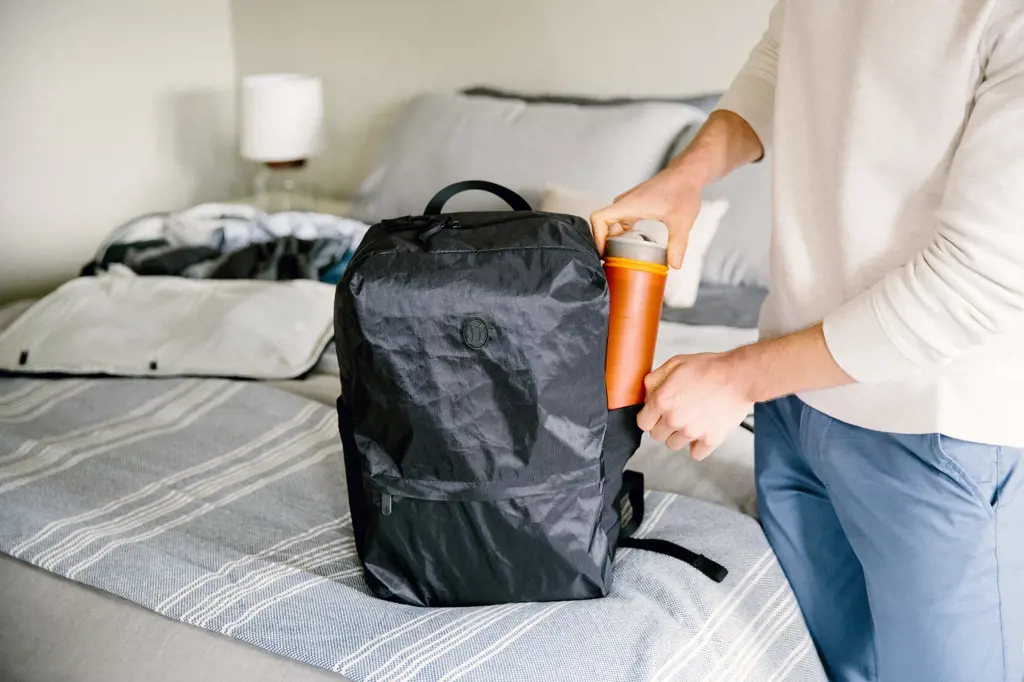
Are you or someone you know facing the daunting process of eviction? It's a challenging and overwhelming experience, but being prepared can make all the difference. That's why we've put together this comprehensive guide on the essential items to pack when facing eviction. From important documents to personal belongings, we'll cover everything you need to have to make the transition as smooth as possible. So, take a deep breath, and let's get started on this journey together.
What You'll Learn
- What essential items should you pack when you are being forced to leave your current living situation?
- How do you prioritize what to pack when you are being kicked out of your home or apartment?
- Are there any legal documents or identification that you should make sure to take with you?
- Are there specific personal belongings, such as sentimental items or family heirlooms, that you should try to preserve in this situation?
- What resources or services are available to help individuals who have been kicked out and need assistance with packing and finding temporary housing?

What essential items should you pack when you are being forced to leave your current living situation?

When you find yourself in a situation where you are being forced to leave your current living situation, it is important to be prepared and pack essential items that will ensure your safety and well-being. Whether you are leaving due to an emergency, a natural disaster, or a domestic violence situation, having the right items in your possession can make a huge difference in how you navigate through this challenging time.
- Important Documents: One of the first things you should pack is a folder or a bag containing all your important documents. This includes identification documents such as your driver's license, passport, birth certificate, social security card, and any other legal documents you may need. It is also a good idea to carry copies of these documents as a backup. These documents are crucial for establishing your identity and accessing important services.
- Money and Banking Information: It is essential to have access to some cash in case of emergencies. Carry enough money to cover your immediate needs such as accommodation, food, and transportation. If possible, have some spare change as well. Additionally, make sure you have all your banking information, including your debit/credit cards and account details. This will enable you to access your funds and manage your finances during this transition period.
- Clothing and Personal Hygiene Items: Pack a few changes of clothes, underwear, and socks. Focus on comfortable and weather-appropriate clothing. Depending on the circumstances, you may not have access to laundry facilities or the opportunity to buy new clothing, so it is important to pack wisely. Don't forget personal hygiene items such as toothbrush, toothpaste, soap, shampoo, and any medication you may need on a regular basis.
- Phone and Charger: In today's digital age, having a functioning phone is crucial for communication and accessing information. Make sure you have your phone and charger with you, and if possible, have a backup power source such as a portable charger or spare batteries. A working phone can be your lifeline in reaching out for help or staying connected with loved ones.
- Important Contact Information: Keep a list of important phone numbers and addresses with you. This includes emergency contacts, friends or family members you can reach out to for support, and relevant service providers such as local shelters, helplines, or legal aid organizations. Having this information readily available can save you valuable time and help you get the assistance you need quickly.
- Essential Daily Items: Consider packing items that are necessary for your daily routine. This may include basic kitchenware such as a small pot, pan, and utensils, as well as a coffee mug and a water bottle. These items will prove useful if you find yourself in temporary accommodations or without access to a kitchen. Additionally, if you have children, remember to pack any essential items they may need, such as diapers, formula, or toys.
- Emotional Support: Going through a forced living situation can be extremely challenging both emotionally and mentally. Remember to pack items that can provide comfort and emotional support. This may include a favorite book, a journal to write down your thoughts and feelings, or any other item that brings you solace and calmness during difficult times.
While the above items are important to have, it is also crucial to prioritize your safety. If you feel unsafe or in immediate danger, do not hesitate to reach out to local authorities or helplines that can provide you with guidance and support. Remember, you are not alone, and there are resources available to help you through this difficult time.
Essential Items to Pack for Rain and Snow: A Comprehensive Guide
You may want to see also

How do you prioritize what to pack when you are being kicked out of your home or apartment?

When facing the difficult situation of being kicked out of your home or apartment, it can be overwhelming to think about what belongings to prioritize when packing. However, by following a systematic approach, you can ensure that you pack the essentials and make the transition as smooth as possible. Here are some steps to help you prioritize what to pack in such circumstances:
- Assess your immediate needs: Before you start packing, take a moment to think about your immediate needs. This includes items like clothing, toiletries, important documents, medications, and essential electronics. These items should be packed first as they are necessary for day-to-day living.
- Consider your long-term needs: Once you have packed the immediate essentials, think about your long-term needs. Ask yourself questions like where you will be staying, the duration of your stay, and the available amenities. This will help you determine what additional items you should prioritize. For example, if you will be staying in a temporary accommodation without kitchen facilities, packing some basic cooking utensils and non-perishable food items might be a good idea.
- Evaluate sentimental value: Packing up a home or apartment often involves making difficult decisions about what to keep and what to let go. Consider the sentimental value of certain belongings when deciding what to pack. Items like family photos, heirlooms, or mementos that hold important memories should be prioritized.
- Take furniture and large items into account: When deciding what furniture and large items to pack, consider the practicality and logistics of moving them. If you have limited time or resources, it may not be feasible to take all your furniture with you. Prioritize essential pieces that are versatile and necessary for your temporary living situation.
- Create a packing strategy: Once you have determined what to prioritize, create a packing strategy. Start by gathering packing supplies such as boxes, tape, and markers. Label each box with the contents and the room it belongs to, as this will make unpacking easier later on. Systematically pack one room at a time, starting with the essentials and moving on to less important items.
Here are a few examples to illustrate the prioritization process:
Example 1: Sarah has been kicked out of her apartment with short notice. She assesses her immediate needs and prioritizes packing her clothing, toiletries, important documents, and medications. She then considers her long-term needs and packs some basic kitchen utensils and non-perishable food items. Finally, she evaluates the sentimental value of certain items and decides to pack her family photo albums and a special gift from her grandmother.
Example 2: John is being evicted from his home and has to move into a smaller apartment. He evaluates his furniture and large items and decides to prioritize his bed, sofa, and dining table as these are the most essential for his everyday living. He also takes into account the practicality of moving other large items and decides to sell or donate some of them.
By following a systematic approach and taking into consideration your immediate and long-term needs, sentimental value, and practicality, you can effectively prioritize what to pack when being kicked out of your home or apartment. Remember to stay organized and seek support from friends or family during this challenging time.
Essential Items to Pack When Moving to Brazil
You may want to see also

Are there any legal documents or identification that you should make sure to take with you?

When traveling, it is important to ensure that you have all the necessary legal documents and identification with you. These documents are essential for various purposes, such as proving your identity, entering a foreign country, and handling emergencies. Here are some of the legal documents and identification that you should make sure to take with you when traveling.
- Passport: A passport is the most important document you should carry with you when traveling internationally. It is your official identification and serves as proof of your citizenship. Make sure your passport is valid for at least six months beyond your planned departure date. Some countries may require a visa in addition to a passport, so it is important to check the visa requirements of your destination before traveling.
- Driver's license: If you plan to drive a car or rent one during your trip, it is advisable to carry your driver's license with you. A valid driver's license will allow you to legally operate a vehicle in most countries. However, it is important to note that some countries may require an International Driving Permit (IDP) in addition to your driver's license. The IDP serves as a translation of your driver's license and is recognized in many countries.
- Identity card: In addition to your passport, it is recommended to carry a government-issued identity card with you when traveling. This can serve as an additional form of identification and can be handy in situations where you may not want to carry your passport everywhere, like when checking into a hotel or using public transportation.
- Travel insurance: Although not a legal document or identification per se, having travel insurance is crucial when traveling. It provides financial protection in case of unforeseen events such as medical emergencies, trip cancellations, or lost luggage. Keep a copy of your travel insurance policy and emergency contact numbers with you at all times.
- Vaccination records: Depending on your destination, you may be required to show proof of certain vaccinations or immunizations. It is important to check the specific vaccination requirements for your destination and carry a copy of your vaccination records if necessary. Some countries may require a yellow fever vaccination certificate when arriving from certain countries.
- Copies of important documents: It is always a good idea to make copies of important documents such as your passport, driver's license, travel insurance policy, and vaccination records. Keep these copies separate from the originals and store them in a safe place, like a hotel safe or in cloud storage. In case you lose any of the original documents, having copies can facilitate the process of obtaining replacements.
Remember to keep your original documents secure at all times. Consider using a money belt or a secure pouch to carry them close to your body. It is also recommended to have digital copies of your documents stored in a secure cloud-based service or emailed to yourself so that you can access them in case of loss or theft.
In conclusion, when traveling, it is important to ensure that you have all the necessary legal documents and identification with you. This includes your passport, driver's license, identity card, travel insurance, vaccination records, and copies of important documents. By being prepared and organized, you can have a smooth and hassle-free travel experience.
Essential Items to Pack in Your Quarantine Bag: A Comprehensive Guide
You may want to see also

Are there specific personal belongings, such as sentimental items or family heirlooms, that you should try to preserve in this situation?

When faced with a situation that could potentially damage or destroy your personal belongings, it's natural to want to prioritize the preservation of sentimental items or family heirlooms. These items often hold great emotional value and can't be easily replaced. However, it's important to approach the preservation process with caution and care. Here are some steps to help you protect and preserve these precious personal belongings.
- Assess the situation: Begin by assessing the level of risk or potential damage that your belongings may be exposed to. Is it a natural disaster, like a flood or fire, or is it something within your control? Understanding the nature of the threat will help you develop a plan.
- Prioritize the most valuable items: Identify the sentimental items or family heirlooms that hold the most value to you. This could include photographs, letters, jewelry, or other objects that have been passed down through generations. Make a list of these items and create a plan to ensure their protection.
- Create a safe storage space: Identify a safe storage space within your home or consider renting a safe deposit box at a bank. Ensure that the storage space is climate-controlled and free from pests. Use acid-free boxes, archival tissue paper, or specialized preservation materials to store delicate items like photographs, textiles, or artwork.
- Digitize important documents and photographs: To safeguard against potential loss or damage, make digital copies of important documents and photographs. Scan them and store them securely on an external hard drive or in an online cloud storage service. This will ensure that you have a backup copy in case the originals are damaged or destroyed.
- Protect against physical damage: If you have valuable items that are susceptible to physical damage, such as fragile china or delicate artwork, take preemptive measures to protect them. Use bubble wrap, acid-free tissue paper, or foam padding to wrap and store these items. Consider storing them in a secure, padded box or crate to minimize the risk of damage during transport or storage.
- Insure your belongings: Consider obtaining insurance coverage for your valuable and sentimental items. While insurance cannot replace the sentimental value of an item, it can provide financial compensation if the item is damaged or destroyed. Consult with an insurance professional to determine the best policy for your specific needs.
- Take preventive measures: To minimize the risk of damage to your personal belongings, take preventive measures within your control. Install smoke detectors, fire extinguishers, and a security system in your home. Keep your home well-maintained to prevent water leaks or other potential hazards. By being proactive, you can reduce the likelihood of a disaster occurring.
Remember, while it's important to prioritize the preservation of sentimental items and family heirlooms, it's also essential to ensure your own safety and that of your loved ones. In situations where your personal safety is at risk, it may be necessary to prioritize evacuation over preserving belongings. Use your judgment and consider the risks and potential consequences before making any decisions.
In conclusion, preserving sentimental items and family heirlooms requires careful planning and attention. By assessing the situation, prioritizing valuable items, creating a safe storage space, digitizing important documents, protecting against physical damage, insuring your belongings, and taking preventive measures, you can increase the chances of preserving these precious personal belongings for future generations to cherish.
Essential Items to Pack for a Turks & Caicos Vacation
You may want to see also

What resources or services are available to help individuals who have been kicked out and need assistance with packing and finding temporary housing?

Being kicked out of one's home can be a traumatic experience, leaving individuals in a vulnerable position with immediate and pressing needs. In such situations, it is essential to know what resources and services are available to offer assistance with packing and finding temporary housing. Here, we will explore the various options available to individuals in this situation.
Local shelters and organizations:
Many cities have shelters and organizations dedicated to helping individuals facing homelessness or eviction. These organizations often provide temporary housing options and assistance with packing and moving. They can connect individuals with shelters, emergency housing, or even help arrange for hotel stays temporarily. When dealing with eviction, it is crucial to reach out to these local resources for immediate assistance.
Social services:
Local social services agencies provide a wide range of support services to individuals facing crisis situations, including eviction. These agencies can help with finding temporary housing options, provide resources for financial assistance, and connect individuals with other relevant support programs. Social workers or case managers can offer guidance and make referrals for packing services or moving assistance.
Non-profit organizations:
Non-profit organizations often run programs that offer aid to individuals who have been kicked out of their homes. These organizations may provide packing assistance, storage facilities, or even financial support to help cover moving costs or temporary accommodation. Don't hesitate to search for and reach out to local non-profits that focus on homelessness prevention or eviction issues.
Community assistance programs:
Many communities have assistance programs in place to support individuals facing eviction. These programs may offer help with packing belongings or provide resources for finding temporary housing. These programs might be run by local government offices, charities, or community-based organizations. It is advisable to contact these programs directly or seek information from community centers or local government offices.
Online resources:
The internet can be a valuable tool for finding resources and assistance. Various websites and online directories provide listings of shelters, services, and programs designed to help individuals in crisis situations. Websites like HomelessShelterDirectory.org, 211.org, or local government websites can provide information on available resources in specific areas. Online communities or social media groups for individuals facing homelessness can also be helpful sources of information and support.
In addition to accessing these services and resources, it is crucial to reach out to friends, family, or support networks for further assistance. They may be able to provide temporary housing or help with packing and moving. Additionally, it is essential to keep important documents and personal belongings safe and accessible during this challenging time.
In conclusion, individuals who have been kicked out of their homes and require assistance with packing and finding temporary housing have several options available. Local shelters, social services, non-profit organizations, community assistance programs, and online resources can provide significant support in these situations. By reaching out to these resources and seeking help proactively, individuals can find the necessary assistance to navigate this challenging period and eventually find stable housing.
The Essential Items to Pack for a June Trip to Hawaii
You may want to see also
Frequently asked questions
When you get kicked out, it's important to pack essential items that will help you survive and stay safe. These include clothing, toiletries, important documents, cash, and a phone.
When it comes to clothing, pack only what you need and what you can carry. A few changes of clothes, including underwear and socks, are essential. Also, consider packing weather-appropriate clothing and a sturdy pair of shoes.
Make sure to pack important documents such as identification cards, passports, driving licenses, social security cards, birth certificates, and any other relevant legal or financial documents. These documents will be crucial for establishing your identity, accessing services, and applying for assistance.
Yes, packing toiletries is essential. Don't forget items such as toothbrush, toothpaste, soap, shampoo, deodorant, a small towel, and any medication you may need. These basic hygiene items will help you stay clean and healthy during this challenging time.
Yes, it's highly recommended to bring some cash with you. In emergency situations, having cash on hand can be extremely helpful for purchasing food, transportation, or basic supplies. However, make sure to keep it secure and hidden to avoid potential theft.







